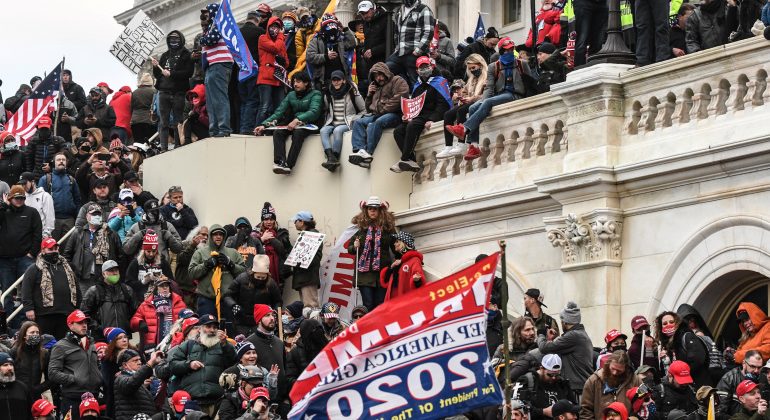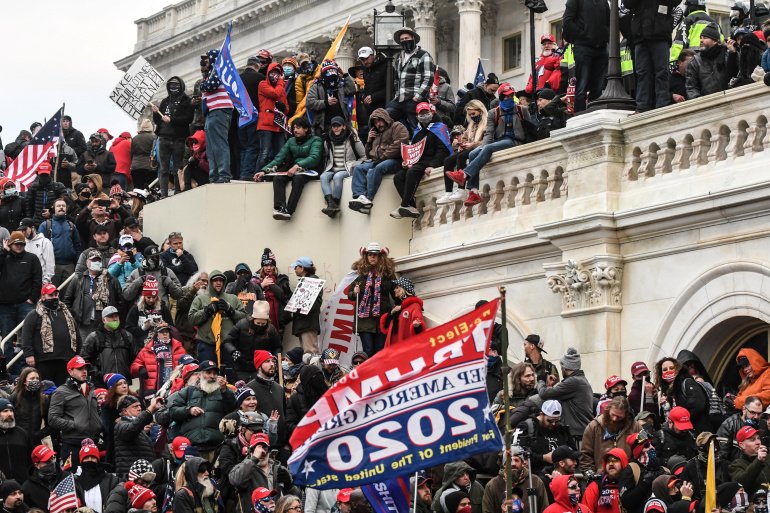

Almost all the 1500-plus rioters from January 6th, 2021 have been pardoned by President Trump; fourteen received commutations but still have felonies on their records. Most of them had pleaded guilty after being indicted and convicted by juries of their peers. According to the proclamation, this “ends a grave national injustice that has been perpetrated upon the American people” and “begins a process of national reconciliation.”
William Kristol writing at The Bulwark observed that “Trump does have constitutional authority” to grant these pardons, including those given to “the most violent and unrepentant of the convicts, and the leaders of dangerous extremist groups.” Trump acted “within his legal powers.” Nevertheless, says Kristol, these pardons are “a fundamental assault on the Constitution and the rule of law,” because the pardons invite more assaults “against both civilians and law enforcement officials who seek to uphold the rule of law. It is the empowerment of pro-Trump vigilantes by offering the promise of pardons if the legal system gets in the way.”
The vice president elect seemed to be thinking along similar lines just a few weeks ago: “I think it’s very simple, look, if you protested peacefully on Jan. 6, and you had Merrick Garland’s Department of Justice treat you like a gang member, you should be pardoned,” Vance said early in January. “If you committed violence on that day, obviously you shouldn’t be pardoned.” Vance had said back in May “If you beat up a cop, of course you deserve to go to prison.”
Vance’s confidence that some of these criminals weren’t deserving of pardons is evident in his language: “obviously,” “of course,” “it’s very simple.” None of that aged well.
What should we make of this? The future could deliver a grim verdict: If it is the case that we experience further politically motivated violence from Trump’s supporters, with more pardons, and especially if a future Democratic president follows suit, we will look back on this as a dark pivot indeed.
But past history doesn’t actually indicate that that’s likely. President George Washington pardoned the two leaders of 1794’s Whiskey Rebellion without encouraging similar rebellions. And while the oath-breaking, secession, and war committed by the southern states in our Civil War were several magnitudes of seriousness greater than what had occurred seventy years earlier, the Lincoln-Johnson policy can be seen as following in Washington’s footsteps. No one would have dreamed, had we captured Osama bin Laden at Tora Bora in 2001, of merely letting him go with a promise never to commit terrorism again. Yet the political and military leaders of the Confederacy were allowed to do just that.
President Trump might have invoked the precedent of “malice toward none, charity for all,” but he did not. His executive order describes the prosecution and conviction of the January 6 rioters as an “injustice.” That thoroughly alters the moral valence of his action, rendering it not as the forgiving of a wrong (committed by the convicted criminals), but the righting of a wrong (committed by the Justice Department). In his verbal comments he referred to these criminals as “our great hostages who for the most part didn’t do stuff wrong.” I’m not ready–perhaps not qualified–to assess the immensity of a president doing something that radical and disruptive to our system of governance.
There is another–very inexact–potential precedent for Trump’s action: President Richard Nixon’s interference with the prosecution of Lieutenant William Calley and others for the war crimes committed at My Lai in 1968. The Army convicted Calley of murdering more than twenty people and sentenced him to life in prison in 1971. They were planning on further prosecutions when Nixon stepped in, voiding Calley’s incarceration, and announcing “he would personally review Calley’s case before any sentence took effect.” That interference led the Army to drop any further prosecutions, and reportedly had a profoundly demoralizing effect on the military.
Nixon had originally condemned the incident, but changed his mind probably for political reasons. His ostentatiously patriotic base united behind Calley, declaring him a hero, and even liberals named him a scapegoat for a thoroughly criminal war. Unlike Trump, Nixon avoided publicly celebrating Calley, but he told “Henry Kissinger that ‘most people don’t give a shit’” whether Vietnamese civilians were killed. Around 70% of Americans–both conservatives and liberals–wanted to see Calley exonerated.
But, at the same time, the argument that Calley wasn’t unusual, that such things happened in war all the time, and that circumstances often made them necessary, seems to have damaged Americans’ views of the war and of military service in general. For “the first time, a majority of the country said that the war was morally wrong.”
We can’t know what the larger effects of Trump’s pardons will be. I hope, of course, that it won’t open the sluice gates to paramilitary violence. The Whiskey Rebellion and the Civil War pardons had no effect in encouraging subsequent rebellions. It is hard to imagine that Trump’s pardons won’t be–at a minimum–emotionally demoralizing to the justice system and to a lot of law enforcement. And while Americans were far less liable to vote on January 6 than Democrats wished, they aren’t on board with declaring these criminals heroes. Some Republican senators and congressmen are apparently shocked and are expressing dismay at the president’s sweeping action. It may be that the consequences of this order will be more complex, subtle, and unsettling in surprising ways, than we can imagine right now.
A close friend of mine served on the Federal grand jury in D.C. that indicted the January 6 rioters. They gave up many hours from their professional life for many months — the term of the grand jury was extended at least once. They told me the worst part was viewing the details of the videos of violence toward the police over and over. Now all that work done by ordinary citizens of the District has been invalidated. So much for the rule of law.
Appreciate your comment VEG!
So, where are all those “Blue Lives Matter” Republicans? Disappeared with all those “law and order” Republicans.
I’ve commented elsewhere on this site about the disease afflicting Republicans with that long German name — das Führerprinzip. Amazing how many of these poor fellows temporarily lost their eyesight, and are explaining that they never saw any violence on 6 January. Even when talking with journalists running clips of the brutal attacks on police, nope, they just can’t see anything! Maybe Kennedy will launch an NIH study of Republican eyesight — nah, he’ll probably spend his time looking for roadkill to throw on the White House lawn. What a prankster!